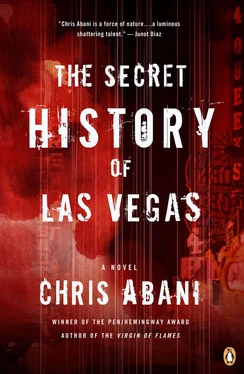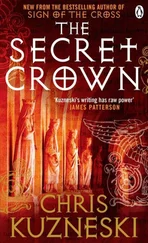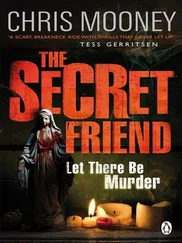Of course he fell, who can resist that kind of love, a love where you are needed desperately? Jan loved Eskia with a zeal he knew was driven by her fear of falling back into the old hate she’d been raised in. But in those dark times you took what comfort you could because in the end it was all grace.
Jan’s ring, which Eskia now wore on his thumb, was now the shape of his heart, hot and weighty with despair. It was all he had left of her. He lost track of Jan when she got arrested. She was gone long enough to accept, even beyond his verbal denials, that she was dead. In a way, his search, when it began, was not to find her, but rather to let her go properly. Working in the new government’s security services was a great help. That’s how he found out about the bodies turning up around the farm at Vlakplaas, and some in the river, too.
He had a hard time finding Vlakplaas. Trauma messes with recollection; things that never existed become part of your memory of a place, and the very things that are absolutely vital to remembering are erased. He got lost several times, stopping always to ask for directions, careful to choose only blacks or coloreds or Indians because it seemed like whites would never tell him how to get there. But everyone pretended they had never heard of it. The most feared place in South Africa, and people who were mere miles from it couldn’t remember where it was, or how to get there.
When Eskia finally found the farm, there was a white Afrikaans family, with very young children, living there. How was it possible? Everyone knew what had happened there. The bars on the windows, bloodstains on the guardhouse, faded but still visible. All of it still there and these people bought it to grow food on? Brought children to live there?
He saw them, a couple of slight girls, blond and sprightly, swimming in that river that had held so many rotting bodies. It was unnatural, and perhaps that was worse even than what had really gone on there.
Farther back from the edges of the farm, up in the hills, a small group was digging for bodies, like people prospecting for treasure. They moved across the stubby grass of the hills, in bright red or black, prodding the ground with converted ski poles or sharpened sticks, feeling always for a looseness, a hollowness in the red earth, for a hint. The figures would straighten up, heads cocked into the wind, listening as though hearing their names. A couple would stop while the others moved on. Engaged in some beautiful ballet only they understood. Moving forward, slowly, but always forward. Leaving a legacy of holes behind them.
Eskia approached and greeted them softly in Zulu, Sawbona. They paused and looked up and that was when he realized they were mostly women. They smiled and returned to their digging, stopping only when they unearthed a body, or bones, or whatever fragment of a person they found. Then they lifted the remains reverentially out of the ground and laid them on a white plastic sheet, awaiting identification. There was a tenderness in this scene, the sheer sorrow that stills anger into a river of serenity, into a clarity so cold its brittleness is more threatening, quivering before shattering into a rage that can obliterate.
He sat on an outcrop of stone and took deep breaths, noticing for the first time the small crowd of people walking between the excavators, pausing by each set of remains, looking for something to identify a loved one, something as small as a tuft of hair or a birthmark. When someone was identified, there was a silence as the remains were gathered and carried back down the hill, past the farm to the road where cars were parked, as though any sound — a cry, a wail — would desecrate the delicate balance the excavators worked with.
Eskia came regularly for six years, joining the silent search, until he found, among a pile of bones, Jan’s ring, with the shimmering butterfly wing. Unlike the others, he took no remains, just the ring. There would be no mourning for him, no grieving. Just a vain hate, one that had no target, no focus, until he found, on a list of names of Vlakplaas personnel, Dr. Sunil Singh.
Asia came back into the room, startling him. With the practiced ease of a croupier, she counted the money in the Bible without seeming to look. She crossed to the middle of the room, stripped, and said: I’m ready.
He tied her to the bedposts with the belts from the hotel robes, and he fucked her until she cried out from an orgasm, then he dozed off beside her, only to awaken half an hour later with a scream.
Shh, she said, holding him with one arm, the other still tied.
Absently he wondered how she’d freed herself.
Are you okay, she asked.
Eskia gasped, coughing, the taste of rust on his tongue as he woke from the dream. It felt like he was back in it all.
Asia hugged Eskia from behind. Hush, she whispered, hush now.
Eskia leaned back into her, felt her full breasts pressed into his back. God, he thought, she smells so good.
Will it help to talk about it?
No, he said simply, no.
There was something in his voice that chilled Asia, made her want to recoil from him.
He reached behind him and ran his hand down her thigh, feeling her shiver. Are you cold, he asked.
Why?
He wanted to say, Because you’re shivering. Instead he looked at her, noting the orgasm-softened face, her eyes tender in spite of herself, and said: What do you think Sunil would say if he knew his friend made you come?
She scuttled back from him abruptly; face shocked as though he’d slapped her, one wrist still bound. What the fuck, she said.
Precisely, he said.
Fuck you, Asia said. Fuck you!
You just did. Multiple pops, remember? Although since you also popped you should refund some of that money.
She spat at him and struggled to untie her other wrist.
Eskia wiped his face and looked at her for a moment. He opened his mouth as though to speak, but instead he punched her full in the face and her neck snapped back, her head hitting the headboard. He swung at her again, but she recovered quickly and moved so he only caught her a glancing blow to her eye. Still it puffed up shut.
She knocked the phone from the beside table, hit the concierge button, and screamed as loud as she could. Eskia stopped midpunch. He could hear the concierge’s voice: Mr. Kent, is everything okay? Asia screamed again and passed out.
Eskia jumped up and dressed hurriedly. He had about three to five minutes before hotel security got to his room. Las Vegas casinos didn’t fuck around with the security of their guests. Safety was imperative for business.
He grabbed his small bag stuffed with cash and passports and walked out leisurely, heading for the elevators. In his thick glasses, he was invisible, and he only had to step aside as security guards barreled past him in the hallway headed for his room. As he stepped into the elevator he wondered why all casino security guards wore red jackets.
Outside the casino, Eskia walked a sweat-fueled pilgrimage down the Strip. Down heat-melted sidewalks, gum-stained, dirty, littered with fliers for escorts and shows, through the crowd of overweight sunburned tourists, past the drunks and homeless, past the partly inebriated gambling veterans, ever south.
Outsider art guarded the exterior of the bar — horses, dinosaurs, and aliens shaped in everything from scrap metal and wood to plastic, concrete, and plaster. Inside, bras in every color and every size — dirty, tattered, stained, and gray from age and wear — drooped down from the ceiling like tired flags. Even though they were higher than head level, Sunil kept ducking, afraid to find himself trailing through the years of sad, pathetic drunken moments the bras represented. A disproportioned Buddha, an odd creature neither frog nor toad, and rabbits with cold maniacal plaster eyes guarded the edges of the bar.
Читать дальше












